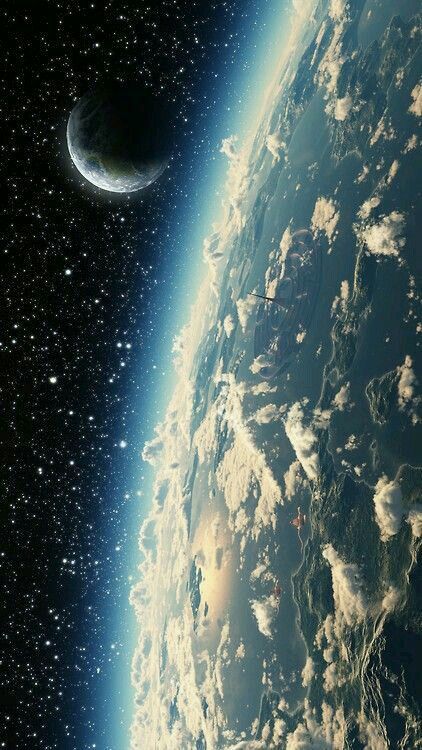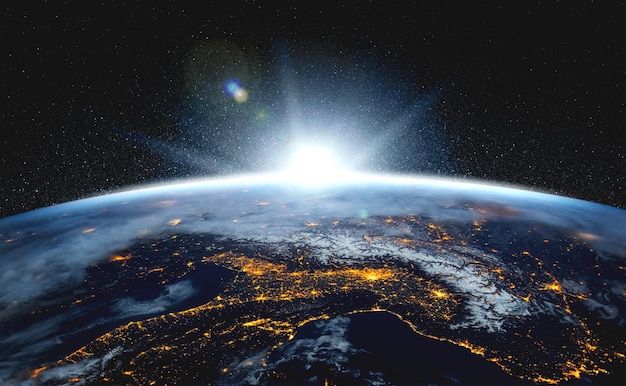Our Beloved Earth
Approximately thirteen and a half billion years ago, the universe exploded into existence. Stars were born, galaxies formed, and among them, our Milky Way took shape. Nearly 4.5 billion years ago, remnants of cosmic gas and dust began to coalesce, birthing the planets that now orbit our Sun. Our Earth, too, started as a fiery, protoplanet—a molten sphere of chaos, circling the Sun in 365 days, as it does today.
But Earth wasn’t always as we know it. In its infancy, it collided with a Mars-sized celestial body, scattering debris that eventually formed our beautiful Moon. Over time, as the planet’s surface cooled and solidified, oceans emerged, and roughly 3.5 billion years ago, life took its first trembling steps in the seas. From that primordial soup began the eternal dance of evolution, culminating in the rise of humanity—a species capable of reshaping the world and questioning its place in the cosmos.

We stood upright, bid farewell to our arboreal homes, and gazed at the sky in awe and confusion. For millennia, we wandered the Earth, hunted, gathered, and learned to wield fire. We named things, forming the bedrock of human civilization. Time passed, and necessity became the mother of invention. We devised astronomy to predict seasons, migrations, and storms—a tool for survival that later became a gateway to understanding the heavens.
As we mastered our environment, we began altering it. Farming and herding replaced wandering, and villages grew into cities. Knowledge expanded, and we needed a way to preserve it. From modest marks on clay to intricate scripts on parchment, writing was born, profoundly transforming human history.
Then, on this same Earth, came Moses, Buddha, Jesus, and Muhammad. Every person who lived or died, every invention, discovery, love, hatred, war, migration, spring, and autumn; every species that went extinct; every song, artwork, symphony, poem, and book—everything happened here, on this small, blue planet. This tiny speck of dust in the vast cosmos witnessed it all.
If we zoom out beyond our galaxy, Earth appears as a pale blue dot—smaller than a grain of sand in the vastness of space. Like a single pixel on a screen, this blue dot contains the entire history of you, me, and everyone who ever lived. We are not the center of the universe. We are but whispers in an infinite expanse. Yet, merely a hundred years ago, under the influence of Aristotle and Ptolemy, we arrogantly believed Earth to be the center of everything.

It was Copernicus, in the sixteenth century, who sobered us with the revelation that Earth orbits the Sun. Seventy years later, Galileo proved that even the Sun is but one of countless stars, further humbling us. Today, we know we are dust on a shoreline, orbiting an average star among billions in our galaxy. Perhaps no one beyond our world even knows we exist. If a black hole swallows us or a gamma-ray burst erases us, no one will mourn our loss.
Yet, on this fragile Earth, we have inflicted horrors beyond measure. This speck of sand floating in the cosmos has witnessed humanity’s darkest deeds. From the Holocaust orchestrated by Hitler to Stalin’s purges, from Pol Pot’s reign of terror to the endless cycles of war and oppression—our history is stained with blood. We used religion as a weapon, enslaved millions, and waged wars that ravaged cities and civilizations. The Crusades, the Holocaust, slavery, colonialism, and modern conflicts like the Syrian Civil War and the Rohingya crisis reveal our capacity for cruelty.
We are like ants fighting over crumbs, oblivious to the universe’s vastness. Briefly shining like dust particles in a ray of sunlight, we are swept away by the winds of time. Our entire history—our achievements and failures—is but a fleeting moment on the cosmic calendar. Humanity emerged at 11:59:46 PM, with all recorded history occupying the final 14 seconds.
What are we? A speck of dust. What is humanity? The outcome of countless trials and errors. There is no divine creator choosing us as special. We are one among many, fortunate enough to exist but selfish in our pursuits. Nothing is eternal. No one lives long enough to define eternity.

Why do we imagine ourselves transcendent? Why do we think we are more than dust? Even soil, larger than dust, is merely dust itself.
Yet, amid this insignificance, there is beauty. This blue dot, fragile and unassuming, is our only home. It bore witness to Einstein’s theories, Teresa’s compassion, and every act of creation and destruction. The same oceans that cradled the first life now cradle us. The same stars that guided ancient navigators now illuminate our skies.
Perhaps the lesson is not in our smallness but in our interconnectedness. If we must fight, let it be for unity. If we must preserve, let it be this Earth—this humble, irreplaceable blue dot in the infinite cosmos. For all we are and all we will ever be is here, on this tiny speck, spinning silently through space.
Author and Researcher: Malaika Arshad and Mohsin Ramzan